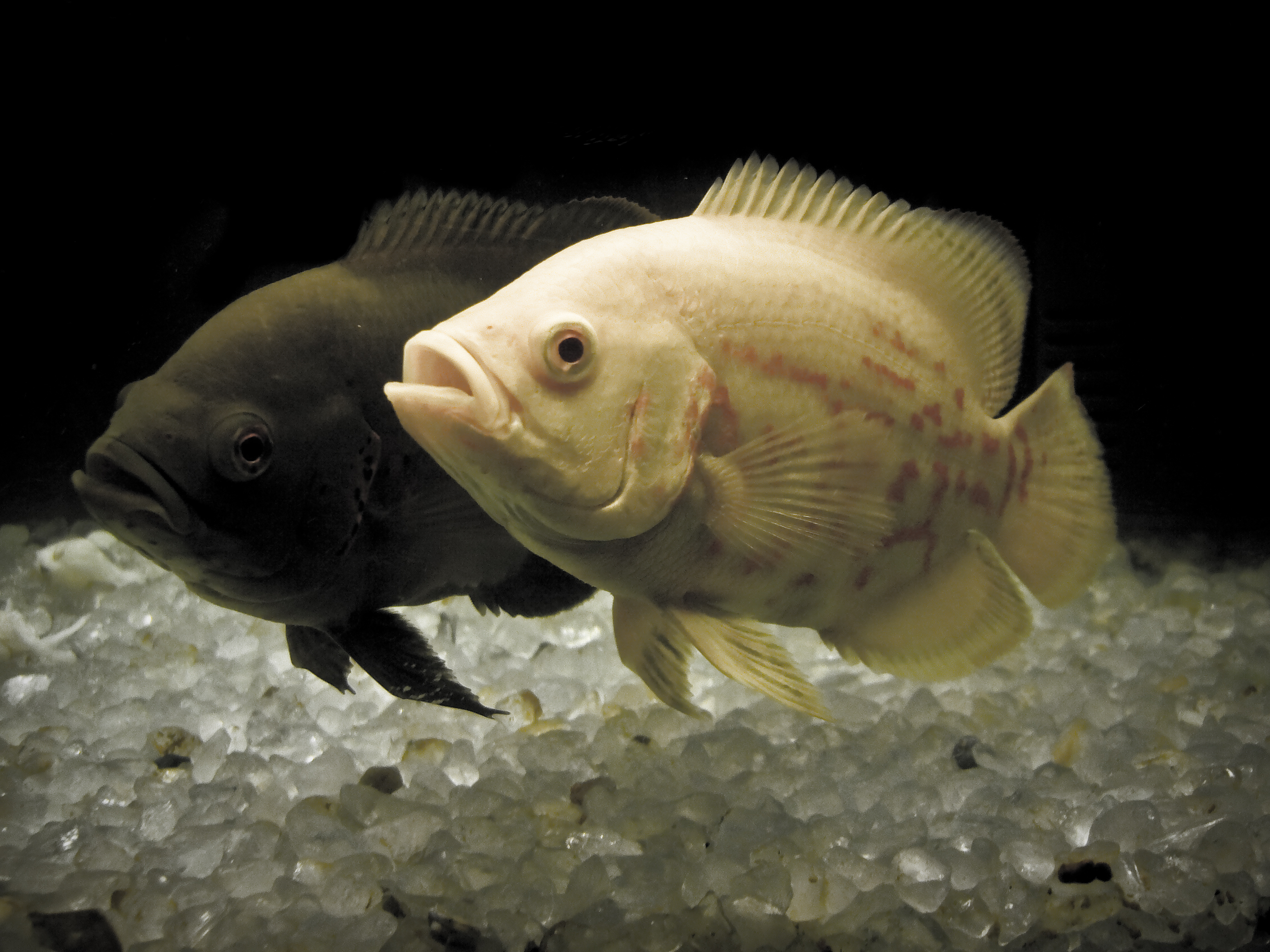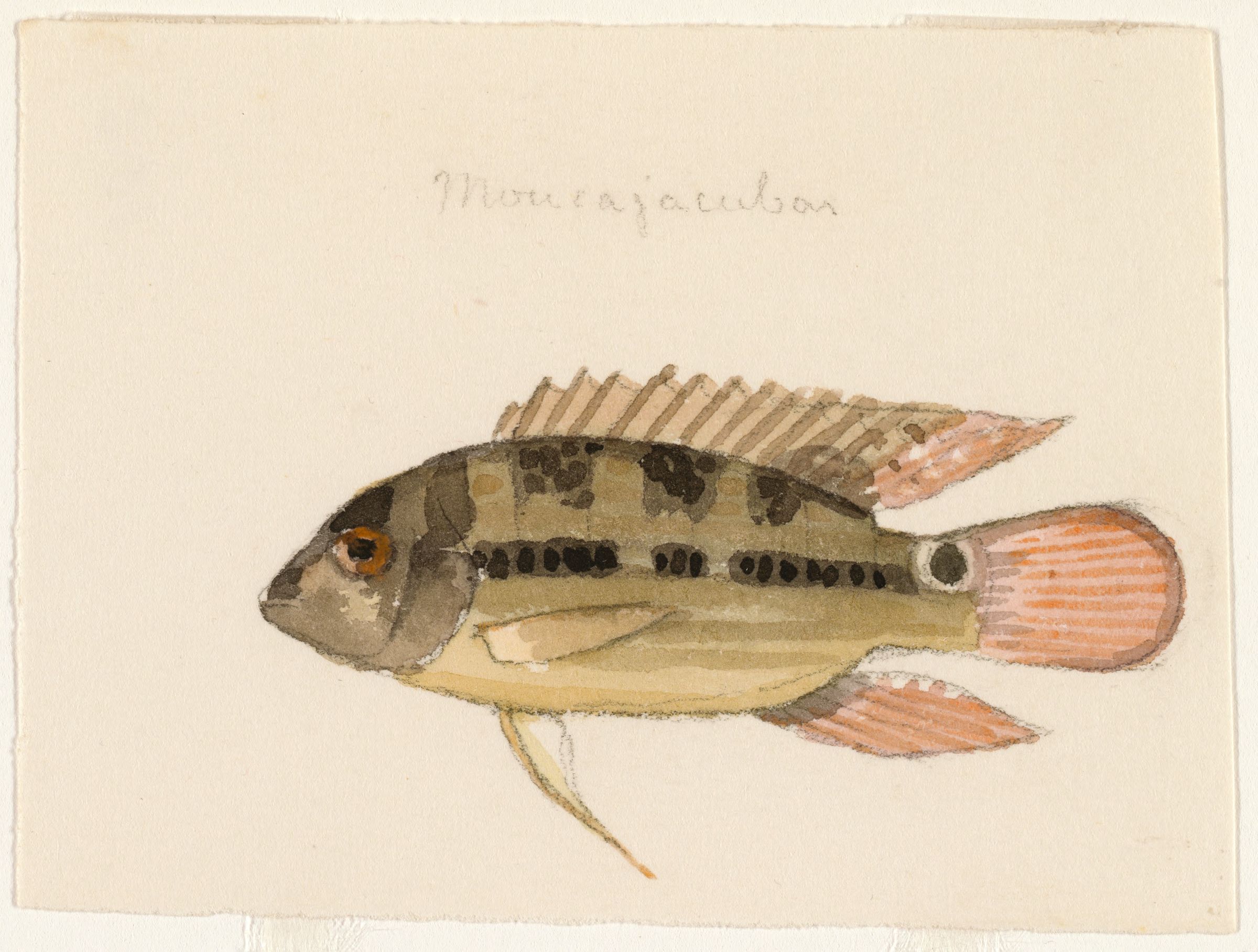|
Astronotus
''Astronotus'' is a genus of South American fish from the family Cichlidae. There are two commonly recognized species in the genus (listed below), though genetic evidence suggests that additional species exist; several of these possibly distinct populations also have very different juvenile coloration from the two recognized species. Both of the commonly recognized species are found in the Amazon Basin, while one of two also is found in the Paraná and Paraguay rivers. ''Astronotus'' species grow to 35 cm in size, and are monomorphic. They are opportunistic omnivores and consume a range of smaller fish, fruits, nuts, crustaceans, mollusks and other invertebrates in the wild. One species, the oscar (''Astronotus ocellatus''), is popular in the aquarium trade. ''A. ocellatus'' forms monogamous pairs which spawn in the open, typically on a flattened stone or in a shallow depression. The juvenile colouration is different from that of the adult and may aid in camouflage of the f ... [...More Info...] [...Related Items...] OR: [Wikipedia] [Google] [Baidu] |
Astronotus Ocellatus
The oscar (''Astronotus ocellatus'') is a species of fish from the cichlid family known under a variety of common names, including tiger oscar, velvet cichlid, and marble cichlid. In tropical South America, where the species naturally resides, ''A. ocellatus'' specimens are often found for sale as a food fish in the local markets. The fish has been introduced to other areas, including India, China, Australia, and the United States. It is considered a popular aquarium fish in Europe and the U.S. Taxonomy The species was originally described by Louis Agassiz in 1831 as ''Lobotes ocellatus'', as he mistakenly believed the species was marine; later work assigned the species to the genus ''Astronotus''. The species also has a number of junior synonyms: ''Acara compressus'', ''Acara hyposticta'', ''Astronotus ocellatus zebra'', and ''Astronotus orbiculatus''. Description ''A. ocellatus'' examples have been reported to grow to about in length and in weight. The wild-caught forms of ... [...More Info...] [...Related Items...] OR: [Wikipedia] [Google] [Baidu] |
Oscar (fish)
The oscar (''Astronotus ocellatus'') is a species of fish from the cichlid family (biology), family known under a variety of common names, including tiger oscar, velvet cichlid, and marble cichlid. In tropical South America, where the species naturally resides, ''A. ocellatus'' specimens are often found for sale as a food fish in the local markets. The fish has been introduced to other areas, including India, China, Australia, and the United States. It is considered a popular aquarium fish in Europe and the U.S. Taxonomy The species was originally described by Louis Agassiz in 1831 as ''Lobotes ocellatus'', as he mistakenly believed the species was marine; later work assigned the species to the genus ''Astronotus''. The species also has a number of junior synonyms: ''Acara compressus'', ''Acara hyposticta'', ''Astronotus ocellatus zebra'', and ''Astronotus orbiculatus''. Description ''A. ocellatus'' examples have been reported to grow to about in length and in weight. The wil ... [...More Info...] [...Related Items...] OR: [Wikipedia] [Google] [Baidu] |
Astronotini
''Astronotus'' is a genus of South American fish from the family Cichlidae. There are two commonly recognized species in the genus (listed below), though genetic evidence suggests that additional species exist; several of these possibly distinct populations also have very different juvenile coloration from the two recognized species. Both of the commonly recognized species are found in the Amazon Basin, while one of two also is found in the Paraná River, Paraná and Paraguay River, Paraguay rivers. ''Astronotus'' species grow to 35 cm in size, and are Monomorphism (biology), monomorphic. They are opportunistic omnivores and consume a range of smaller fish, fruits, nuts, crustaceans, mollusks and other invertebrates in the wild. One species, the Oscar (fish), oscar (''Astronotus ocellatus''), is popular in the aquarium trade. ''A. ocellatus'' forms monogamy in animals, monogamous pairs which spawn in the open, typically on a flattened stone or in a shallow depression. The ju ... [...More Info...] [...Related Items...] OR: [Wikipedia] [Google] [Baidu] |
Astronotus Crassipinnis
''Astronotus crassipinnis'' is a South American fish in the cichlid family from the southern Amazon basin and the Paraná–Paraguay basins. It is not as well-known or common in the aquarium trade as its relative, the more northernly distributed oscar (''A. ocellatus''). ''A. crassipinnis'' reaches up to in length. Etymology The genus name ''Astronotus'' comes from the Greek words ''astra'' ("ray") and ''noton'' ("back"). The species name ''crassipinnis'' comes from the Latin words ''crassus'' ("fat") and ''pinna'' ("fish"). In the aquarium The species is very rare in the aquarium hobby, where they are sometimes known as "fat oscars". When they appear, they are often mistaken for the common oscar Oscar, OSCAR, or The Oscar may refer to: People and fictional and mythical characters * Oscar (given name), including lists of people and fictional characters named Oscar, Óscar or Oskar * Oscar (footballer, born 1954), Brazilian footballer ... (''A. ocellatus''). References ... [...More Info...] [...Related Items...] OR: [Wikipedia] [Google] [Baidu] |
Cichlid Genera
Cichlids () are a large, diverse, and widespread family of percomorph fish in the family Cichlidae, order Cichliformes. At least 1,760 species have been scientifically described, making it one of the largest vertebrate families, with only the Cyprinidae being more speciose. New species are discovered annually, and many species remain undescribed. The actual number of species is therefore unknown, with estimates varying between 2,000 and 3,000. They are native to the Neotropics, Africa (including Madagascar), the Middle East, and the Indian subcontinent, although some species have been introduced worldwide. Many cichlids, particularly tilapia, are important food fishes, while others, such as the '' Cichla'' species, are valued game fish. The family also includes many popular freshwater aquarium fish kept by hobbyists, including the angelfish, oscars, and discus. Cichlids have the largest number of endangered species among vertebrate families, most in the haplochromi ... [...More Info...] [...Related Items...] OR: [Wikipedia] [Google] [Baidu] |
Orinoco River
The Orinoco () is one of the longest rivers in South America at . Its drainage basin, sometimes known as the Orinoquia, covers approximately 1 million km2, with 65% of it in Venezuela and 35% in Colombia. It is the List of rivers by discharge, fourth largest river in the world by Discharge (hydrology), discharge volume of water (39,000 m3/s at Orinoco Delta, delta) due to the high precipitation throughout its catchment area (ca 2,300 mm/a). The Orinoco River and its tributaries are the major transportation system for eastern and interior Venezuela and the Llanos of Colombia. The environment and wildlife in the Orinoco's basin are extremely diverse. Etymology The river's name is derived from the Warao language, Warao term for "a place to paddle", itself derived from the terms ''güiri'' (paddle) and ''noko'' (place) i.e. a navigable place. History The mouth of the Orinoco River at the Atlantic Ocean was documented by Christopher Columbus on 1 August 1498, during his Christo ... [...More Info...] [...Related Items...] OR: [Wikipedia] [Google] [Baidu] |
Donald Charles Taphorn Baechle
Donald is a Scottish masculine given name. It is derived from the Gaelic name ''Dòmhnall''.. This comes from the Proto-Celtic *''Dumno-ualos'' ("world-ruler" or "world-wielder"). The final -''d'' in ''Donald'' is partly derived from a misinterpretation of the Gaelic pronunciation by English speakers. A short form of Donald is Don, and pet forms of Donald include Donnie and Donny. The feminine given name Donella is derived from Donald. ''Donald'' has cognates in other Celtic languages: Modern Irish ''Dónal'' (anglicised as ''Donal'' and ''Donall'');. Scottish Gaelic ''Dòmhnall'', ''Domhnull'' and ''Dòmhnull''; Welsh '' Dyfnwal'' and Cumbric ''Dumnagual''. Although the feminine given name '' Donna'' is sometimes used as a feminine form of ''Donald'', the names are not etymologically related. Variations Kings and noblemen Domnall or Domhnall is the name of many ancient and medieval Gaelic kings and noblemen: * Dyfnwal Moelmud (Dunvallo Molmutius), legendary king of ... [...More Info...] [...Related Items...] OR: [Wikipedia] [Google] [Baidu] |
Louis Agassiz
Jean Louis Rodolphe Agassiz ( ; ) FRS (For) FRSE (May 28, 1807 – December 14, 1873) was a Swiss-born American biologist and geologist who is recognized as a scholar of Earth's natural history. Spending his early life in Switzerland, he received a PhD at Erlangen and a medical degree in Munich. After studying with Georges Cuvier and Alexander von Humboldt in Paris, Agassiz was appointed professor of natural history at the University of Neuchâtel. He emigrated to the United States in 1847 after visiting Harvard University. He went on to become professor of zoology and geology at Harvard, to head its Lawrence Scientific School, and to found its Museum of Comparative Zoology. Agassiz is known for observational data gathering and analysis. He made institutional and scientific contributions to zoology, geology, and related areas, including multivolume research books running to thousands of pages. He is particularly known for his contributions to ichthyological classification, incl ... [...More Info...] [...Related Items...] OR: [Wikipedia] [Google] [Baidu] |
Johann Jakob Heckel
Johann Jakob Heckel (23 January 1790 – 1 March 1857) was an Austrian taxidermist, zoology, zoologist, and ichthyology, ichthyologist from Mannheim in the Electoral Palatinate. He worked at the Royal natural history cabinet in Vienna which later became the Austrian Museum of Natural History. Life Heckel was born in Mannheim, the son of a namesake music teacher and Sophia née Reinhardt. He also had a namesake brother who studied music and was educated at home and lived in Vienna for a while. Another brother was Karl Ferdinand Heckel (1800-1870) who also studied music. In 1805 the family fled the French to Pressburg and then to Pest. Heckel visited the Georgicon agricultural college in 1806. His father bought a farm in Gumpoldskirchen and after the death of his father in December 1811, his mother took over the farm, assisted by his brother. He married Barbara Baumgartner in 1817 and in 1818 he was working at the Vienna Naturaliencabinet (which later became the Naturhistorisches Mu ... [...More Info...] [...Related Items...] OR: [Wikipedia] [Google] [Baidu] |





